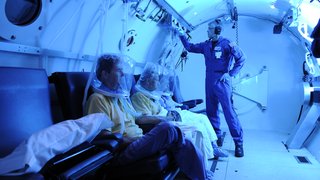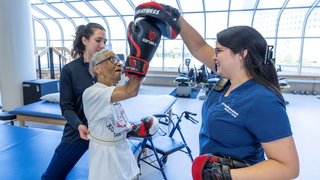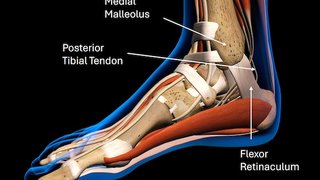Chronic pain solutions require a ‘biopsychosocial’ approach
May 31, 2024
Ozlem Tekelioglu, Psy.D., an Assistant Professor in the Department of Psychiatry, contributed to this article.

All of us can relate to acute pain. After all, who hasn’t felt the sting of stubbing a toe or the radiating tingle of banging an elbow on a table.
But acute pain is temporary. Chronic pain is an entirely different beast, and it is complex to diagnose and treat. Chronic pain is a condition and not just a symptom of illness or injury, and it should be treated as such. Usually caused by multiple compounding factors, chronic pain is also much more common than many people know.
A 2023 study from the National Institutes of Health showed that nearly 21% of adults in the U.S. have chronic pain and 8% have high impact chronic pain, which limits work or life activities on most days. That’s more than the number of Americans who have diabetes.
Unfortunately, pain is commonly minimized or left untreated because patients and some providers see it as a normal part of aging or healing from injury. Some even view it as a sign of weakness. For patients with invisible chronic illnesses, such as migraine or fibromyalgia, pain is often dismissed as “all in your head,” which can be very frustrating.
Effective pain management requires a thoughtful, team-based approach from providers who truly listen and understand that pain is influenced by biomedical, psychological, social, and environmental factors.
UT Southwestern’s Multidisciplinary Pain Clinic provides advanced therapies to treat chronic pain from all angles – head to toe. As one of the few Texas pain management centers with on-site experts in pain, behavioral medicine, and physical medicine and rehabilitation, we are equipped to personalize treatment plans to help improve patients’ quality of life. The first step is truly listening to patients as they describe the type, frequency, and triggers of their pain.
Examples of chronic pain
Arthritis
Endometriosis
Headaches and migraine
Low-back pain
Fibromyalgia, which includes pain, sleep disturbances, and fatigue
Pain is personal
Pain symptoms present differently for every patient. Our pain specialists want to hear your story to learn more than just what hurts. We want to know your health history and how your pain affects your quality of life. This allows us to prioritize relieving the most important pain first.
Acute, short-term pain can be a sign of injury or disease, and it usually goes away in six months or less when the underlying cause is resolved. Examples of acute pain include a cut, a pulled muscle, or even a fever.
Chronic pain lasts longer than six months and occurs consistently or when triggered by external stimuli such as a particular movement, sound, or food. Active pain signals in the nervous system may remain after the original source heals, leading to symptoms such as tense muscles, appetite decline, depression, anger, and anxiety.
Before patients are referred to our clinic, most have tried several conservative treatments that focus on just one aspect of their biopsychosocial experience, such as anti-inflammatory medications or mental health counseling. However, chronic and acute pain can coexist, and treating just one part of the whole is not effective long term.
Our pain specialists understand these nuances, and we work together to develop personalized plans that deliver lasting relief.
Related reading: Ehlers-Danlos syndrome: Diagnosing and treating an ‘invisible’ disease
“The body is designed to handle acute pain well. But when pain becomes chronic, the pain itself becomes the disease, regardless of where it began.”
Amol Patwardhan, M.D., Ph.D.
Example: Treating collective pain symptoms
Some pain conditions are fairly cut and dry. If a patient has debilitating headaches several days a month, a migraine is a likely culprit, and they’d expect to see a neurologist or headache specialist to get a diagnosis.
But what if they have a collection of symptoms that don’t point to a specific, identifiable condition? For example, a patient may come to us with a variety of pain-related symptoms, such as:
- Anxiety
- Sleep disturbance
- Back pain
- Neuropathy – numbness or tingling in the hands or feet
Our Multidisciplinary Pain Clinic team specializes in caring for these patients and streamlining the appropriate treatment. The diagnosis and treatment process can occur in one visit and may include:
- Head-to-toe evaluation with a primary care provider
- Comprehensive neurological exam
- Emotional wellness conversation with a behavioral health specialist
- CT or MRI to capture images of the brain, spine, or nerves

With a full picture, we can diagnose the root cause of the pain and provide an appropriate, personalized treatment plan that could include:
- Cognitive behavioral therapy (talk therapy)
- Conversation with our sleep psychologist
- Lifestyle recommendations to avoid anxiety triggers
- Diet and exercise changes to encourage better nutrition and sleep hygiene
- Mindfulness and relaxation techniques to manage stress
- Medications to relieve inflammation and pain
- Physical therapy to improve gait, posture, and mobility
- Referral for surgery to decompress or revitalize damaged nerves
This multidisciplinary approach is effective at treating all kinds of chronic pain, including orthopedic, diabetic neuropathy, and cancer-related pain.
With specialists from every discipline needed to address chronic pain, we are prepared to develop tailored treatment plans for any condition with a singular goal in mind: reducing the frequency and severity of pain, improving quality of life, and promoting long-term wellness.
To visit with a pain management specialist, call 214-645-8300 or request an appointment online.












